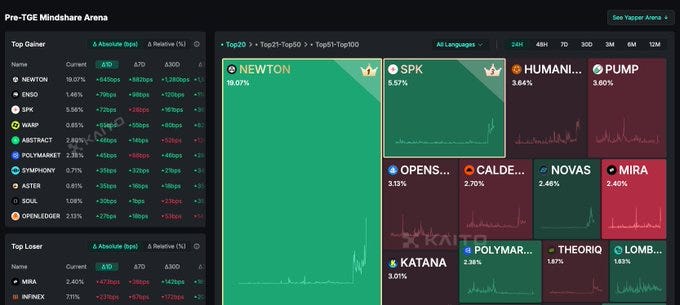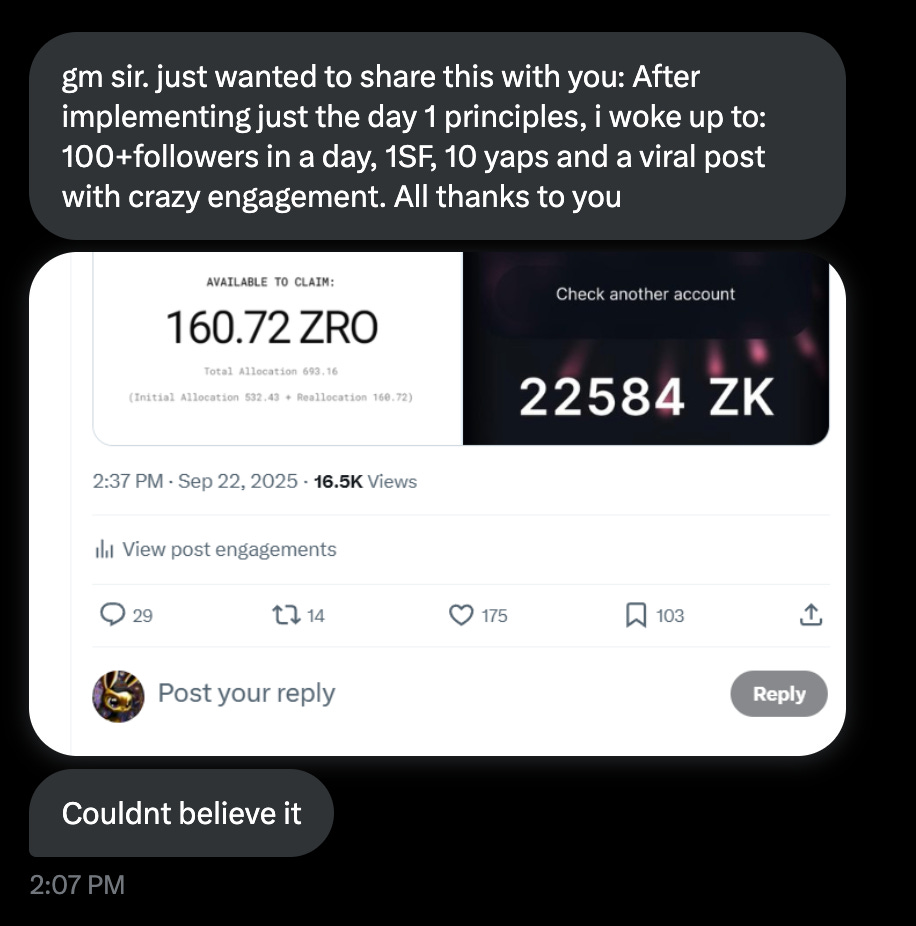InfoFi is broken. Here are 7 harsh truths
If InfoFi is working, why does your timeline feel worse than ever?
Everyone's yapping, but no one is thinking. Readers are jaded with the constant slop.
The system will eventually collapse, unless something changes soon.
Union's recent Hall Cast with shared harsh truths about the current state of InfoFi.
Here's what I resonated with during the discussion:
InfoFi encourages incentive-driven content
The current state of InfoFi is more of post-to-earn:
Everyone can talk about a project and get paid, even if they don’t care about it.
All they need is to bullpost and shill the project to climb the leaderboard.
This was exactly what I highlighted about Story:
Everyone was spamming “IP is inevitable” and other nonsense until it became annoying.
But without any incentives (like now):
No one is talking about Story anymore.
n its current state, anyone can shill whatever they want without any repercussions:
There’s nothing at stake that accounts will lose if they shill without integrity.
So until something changes with the current system:
Noise and low-quality content will dominate the timeline.
But this makes my life easier when filtering the noise:
InfoFi shows a creator’s true colours
I’m thankful for InfoFi because it cleanses my timeline.
It shows me which accounts I should mute because they are shilling nonstop.
The algo will continue to serve me nonsense unless I’m more proactive in curating my feed.
So I’ve become more aggressive with muting:
Any account that provides noise (and not value) will be under this list.
Especially if the only thing you talk about is Kaito leaderboard projects without adding to the conversation.
Noise is everywhere, and it’s getting increasingly hard to find good alpha.
It’s up to us to filter the noise and tell the algo what we want to see.
And all this noise isn’t helping either:
InfoFi is meant for retail, not builders
Projects with Yapper leaderboards do not attract builders.
Mindshare doesn’t mean anything to them.
The countless “gm-“ posts won’t attract them to a project either.
Attention generated through yapping is meant to attract retail interest in the project.
Which is likely in hopes of them finding out more about the token and possibly pumping it.
That’s why many choose to optimise for reach and engagement instead of value.
But many are just trying to game the system:
InfoFi is the next SEO
During the early stages of SEO, the algorithm was heavily exploited.
Many used keyword stuffing was a trick used by many websites to rank for a certain search term.
And the same thing is happening to InfoFi:
Everyone wants the playbook to rank on leaderboards and earn Yaps.
They'll try any tricks to boost their ranking.
But once the formula or algo is known:
It defeats the purpose since every account will make the same type of content.
Everything becomes commoditised:
A sea of mediocrity where no one bothers about your posts.
Instead of optimising for the algorithm, optimise for your audience.
Find out what problems they have and focus on solving them every single day.
InfoFi encourages inconsistency and inauthenticity
I loved how L2s were the most hated topic a few months back.
But once Caldera started their Yapper leaderboard:
Everyone was shilling about the Metalayer and L2s are the future.
InfoFi lets anyone talk about anything, even when they are conflicting.
All that matters is which project pays the most at any point in time.
But if you want to yap, yap consistently.
Yap about what you believe in, rather than what gives you the highest rewards.
Our followers are watching our every move.
Every post shapes their opinion of us (whether it’s good or bad).
And once that trust is lost, we can never get it back.
InfoFi discourages honest content
Many are afraid to 'talk bad' about a project for fear that they will lose their place on the leaderboard.
This makes all content about that project one-dimensional:
Everyone would play it safe with overly positive shills.
While no one dares to share negative sentiments.
If a project truly wants to evolve and make the best product possible:
They would welcome any constructive feedback to improve the product.
Projects that penalise anyone who shares their honest thoughts are trying to make it look perfect.
InfoFi pays to inflate metrics
Projects get to choose what metrics they use to rank accounts on their Yapper leaderboards.
And most of them seem to choose vanity metrics and engagement.
Creators will choose to farm for engagement rather than value, leading to low quality posts.
Shilling is fine, but be thoughtful about it.
Projects are currently just paying users to inflate their metrics.
But once the rewards are gone, there’s no reason for them to stick around.
It becomes a zero-sum game where the value in the system doesn’t grow:
It’s just recycled to the latest projects.
This also highlights whether there’s real value in the project:
Accounts won’t have anything to say about the project if it’s hard to market.
No one builds revenue or good products anymore, because hype is more important.
InfoFi is not the problem
Is InfoFi bad? No.
Is Kaito bad? No.
At the end of the day, both are just tools for projects to use.
The current state of InfoFi encourages low-quality slop, but I believe this will change.
Projects need to stop incentivising inflated metrics over real value.
InfoFi does have its perks, like @0xkaiserkarel mentioned:
They’re able to identify loyal supporters and reward them accordingly.
Instead of ones that shill every project that has a leaderboard.
It’s so tempting to play the InfoFi game via the farming route:
I’m likely a fool for leaving so much money on the table because I’m not yapping on multiple leaderboards.
But at the end of the day, every creator faces this dilemma:
Cash out now with whatever social capital you own
Play the long-term game and focus on building trust by consistently providing value
InfoFi needs to change and reward quality over vanity metrics.
It will only thrive and be of real value once it’s a positive-sum game.
Huge thanks to @bankshelby1 for sharing this call with me.
If you enjoyed this, I share weekly strategies on becoming a future-proof airdrop hunter through a strong onchain and social footprint.
Join us here to get the next issue (every Monday):
The 30-day challenge to go from zero to Signal Creator
Want to capture the next wave of airdrops? You need both onchain and social reputation.
Stop wasting hours on low-value tasks and start building habits and systems that projects will reward with bigger airdrops.
Build the foundations for a reputable brand in just 30 days with one actionable tip you can implement each day.
It’s time to stop burning out on low-value tasks:












I feel the same, the feed got so much worse and many formerly good creators are just posting trash now.
Time to mute more and unfollow.